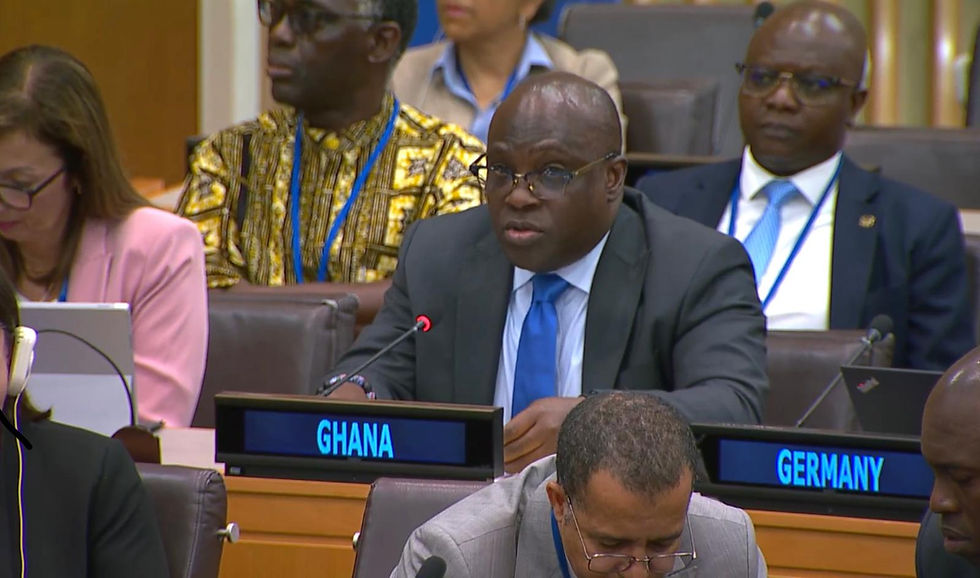AFRICAN GROUP STATEMENT BY H.E. MR. HAROLD AGYEMAN AT THE INTERNATIONAL TAX COOPERATION - FIRST SUBSTANTIVE SESSION 2025
- Aug 4, 2025
- 4 min read
Delivered by H.E. Harold Agyeman
Permanent Representative of Ghana to the United Natons
4th August 2025

Mr. Chair, Excellencies, Distinguished Delegates,
Let me begin by extending our warmest congratulations to the newly elected members of the Bureau.
We also take this opportunity to express our sincere gratitude to you, Mr. Chair, as well as to the Co-Leads of the various workstreams, all members of the Bureau and the secretariat, for the exceptional work you have undertaken during the intersessional period.
The Africa Group recognizes the significant effort invested in the preparation of the detailed issues notes, and the thoughtful facilitation of consultations. We are also thankful for the insightful written contributions from Member States, which form the foundation upon which our deliberations for this session will build.
Mr. Chair,
We gather here at a truly historic juncture, not only for the Global South, but for every nation that has long been denied an equitable seat at the international tax table. This is not just another meeting. It is the first time in history that the global community, under the auspices of the United Nations, is coming together to design a new international framework convention on tax cooperation, one that is inclusive, one that is just, and one that is driven by shared principles rather than power asymmetries.
The recent announcement by the G7 to exempt some countries from their commitments under Pillar Two serves as a powerful reminder of the broken nature of the current tax architecture. It highlights a truth many of us have long known that the status quo is not only inadequate, it is unfair.
The current system, driven by club-based arrangements, continues to marginalize the voices of the many in favour of the few. It is precisely because of such developments that this process, this United Nations Framework Convention, must succeed.
The Africa Group comes to this session with hope, determination, and a deep sense of responsibility. We are not here to replicate old structures or reinforce existing imbalances.
We are here to co-create something new. A system that works for all. A framework that levels the playing field. A convention rooted in equity, transparency, and the sovereign right of every nation to raise revenue justly from the economic activity that occurs within its borders.
Excellencies, Distinguished Delegates,
Allow me now to share some of the Group’s priorities across the various workstreams.
On workstream I, the Africa Group emphasizes the need to expand the commitments outlined in paragraph 10 of the Terms of Reference to include critical issues such as the taxation of income from natural resource extraction. Additionally, the Group highlights the importance of prioritizing the development of the Convention’s structural and governance elements such as the Conference of the Parties, the Secretariat, and Subsidiary Bodies given their foundational role and the need for sufficient time to fully elaborate them.
Regarding Workstream II, the Group emphasizes that the Protocol should be future-proof by covering a wide range of services, including digital and emerging ones; uphold the principle of taxing where economic activity and value creation occur; follow simple and administrable rules; and include a multilateral solution to overcome limitations imposed by existing tax treaties.
The Africa Group's position on work stream III emphasizes the urgent need to address cross-border tax disputes in a globalized economy that often disadvantages countries with limited access to mechanisms like Mutual Agreement Procedures and arbitration. The Group calls for a fair, accessible, and balanced dispute resolution framework that avoids replicating inequities of investor-State arbitration. It supports optional mechanisms with strong safeguards and technical support, including joint audits, capacity-sensitive APAs, and regionally adaptable compliance models.
Mr. Chair, Distinguished Delegates,
Before I conclude, allow me to raise a matter of institutional importance. It has now been eight months since the adoption of Resolution 79/235 and yet the implementation of some of its core elements particularly operational paragraph 12 relating to the provision of the necessary facilities and resources, including a technical secretariat to support the work of the Committee has proceeded at an unacceptably slow pace.
The Africa Group recognizes the serious liquidity constraints currently confronting the United Nations. However, we must be clear: this process, the development of a UN Framework Convention on International Tax Cooperation, must be treated as a priority.
It is not simply a technical exercise. It is a transformative opportunity to correct systemic imbalances in the global tax system and to place the United Nations at the heart of global economic governance, where it rightfully belongs.
The credibility of this process depends on timely institutional support and adequate resourcing. We therefore urge the Secretariat and the wider UN system to take all necessary steps to accelerate implementation and ensure this effort receives the backing it deserves.
We have before us a unique opportunity to craft a framework that will shape global tax cooperation for generations. And while the road ahead may not be easy, we are encouraged by the spirit of engagement, mutual respect, and shared purpose that this process has fostered so far.
The Africa Group believes that this process belongs to all of us. It is inclusive. It is transparent. And it must remain grounded in the fundamental principle of equality among nations. We thank all delegations for their continued engagement, and we call on each and every one of you to bring your best ideas, your boldest thinking, and your deepest commitment to justice to the table.
Thank you.




Comments